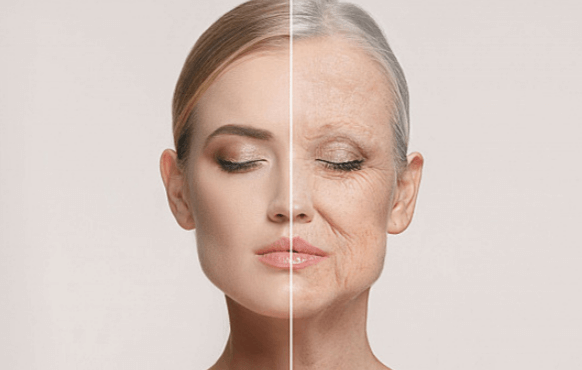Skin Aging: Understanding and Managing the Process

Skin aging is an inevitable biological process influenced by genetic and environmental factors. As we age, the skin undergoes various changes that affect its appearance and function. Understanding these changes is crucial for effective management and graceful aging.
The Science of Skin Aging
1. Intrinsic Aging: Intrinsic aging, also known as chronological aging, is a natural process influenced by our genetic makeup. This type of aging is characterized by:
- Decreased Collagen Production: Collagen provides structure and strength to the skin. With age, collagen production slows, leading to sagging skin and wrinkles.
- Reduced Elastin: Elastin fibers provide elasticity. Their decline results in less firm and more fragile skin.
- Thinning of the Epidermis: The outermost layer of the skin becomes thinner, making it more susceptible to damage.
- Slower Cell Turnover: The rate at which new skin cells replace old ones decreases, resulting in a dull complexion.
2. Extrinsic Aging: Extrinsic aging is caused by external factors and lifestyle choices. It can accelerate the aging process and is responsible for many visible signs. Key factors include:
- Sun Exposure: UV radiation from the sun breaks down collagen and elastin, leading to premature wrinkles and pigmentation issues.
- Pollution: Environmental pollutants can damage the skin’s barrier, leading to inflammation and accelerated aging.
- Smoking: Tobacco smoke reduces blood flow to the skin and contributes to the breakdown of collagen and elastin.
- Diet and Hydration: Poor nutrition and inadequate hydration can affect the skin’s health and appearance.
Signs of Skin Aging
- Wrinkles and Fine Lines: Wrinkles, particularly around the eyes, mouth, and forehead, are often the first visible signs of aging. They result from the breakdown of collagen and elastin.
- Sagging Skin: Loss of skin elasticity leads to sagging, especially around the jawline, neck, and under the eyes.
- Dryness and Rough Texture: Aging skin loses moisture more easily, leading to dryness and a rough texture.
- Pigmentation Changes: Age spots, also known as liver spots and uneven skin tone, can occur due to prolonged sun exposure and other environmental factors.
- Thinning and Fragility: The skin becomes thinner and more fragile, prone to bruising and tearing.
Read also Understanding The Role Of Open Enrollment In Health Insurance Plans
Managing Skin Aging
While aging is a natural process, there are several strategies to manage and mitigate its effects:
1. Sun Protection:
- Sunscreen: Use broad-spectrum sunscreen with an SPF of at least 30 daily, even on cloudy days.
- Protective Clothing: Wear hats, sunglasses, and long-sleeved clothing to shield your skin from UV radiation.
2. Skincare Routine:
- Cleansing: Use a gentle cleanser to remove impurities without stripping the skin of its natural oils.
- Moisturizing: Hydrate the skin with a moisturizer suited to your skin type to maintain its barrier function.
- Anti-Aging Ingredients: Incorporate products with retinoids, peptides, and antioxidants (e.g., vitamin C) to promote collagen production and protect against free radical damage.
3. Healthy Lifestyle:
- Diet: Eat a balanced diet rich in antioxidants, vitamins, and minerals to support skin health.
- Hydration: Drink plenty of water to keep the skin hydrated from within.
- Sleep: Ensure adequate sleep to allow the skin to repair and regenerate.
4. Professional Treatments:
- Dermal Fillers and Botox: These treatments can reduce the appearance of wrinkles and restore volume to the face.
- Chemical Peels and Microdermabrasion: These procedures exfoliate the skin, promoting cell turnover and improving texture.
- Laser Therapy: Laser treatments can address pigmentation issues and stimulate collagen production.
By understanding the factors contributing to skin aging and adopting a comprehensive approach to skincare and lifestyle, you can age beautifully and maintain healthy, radiant skin at any age.






